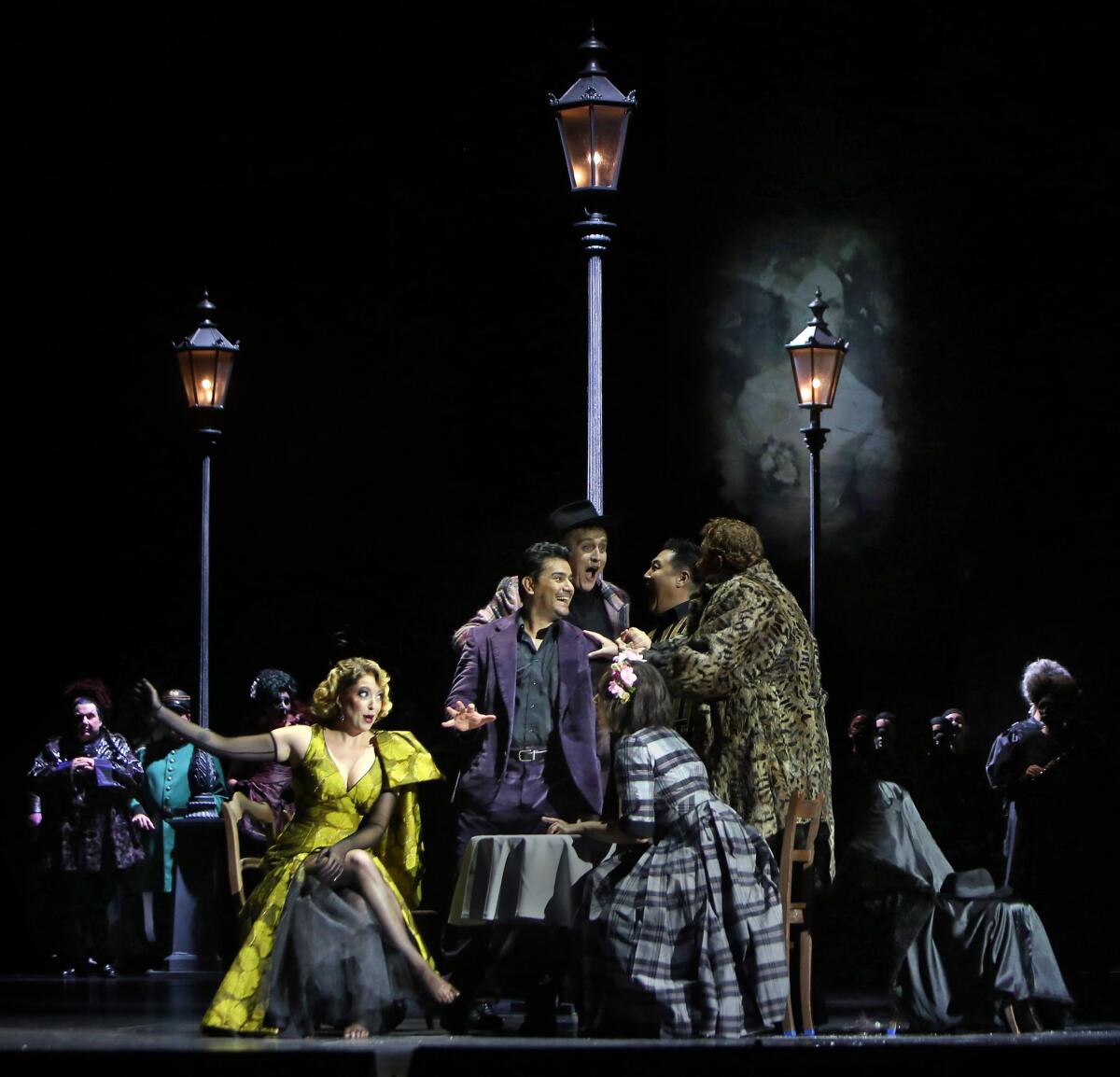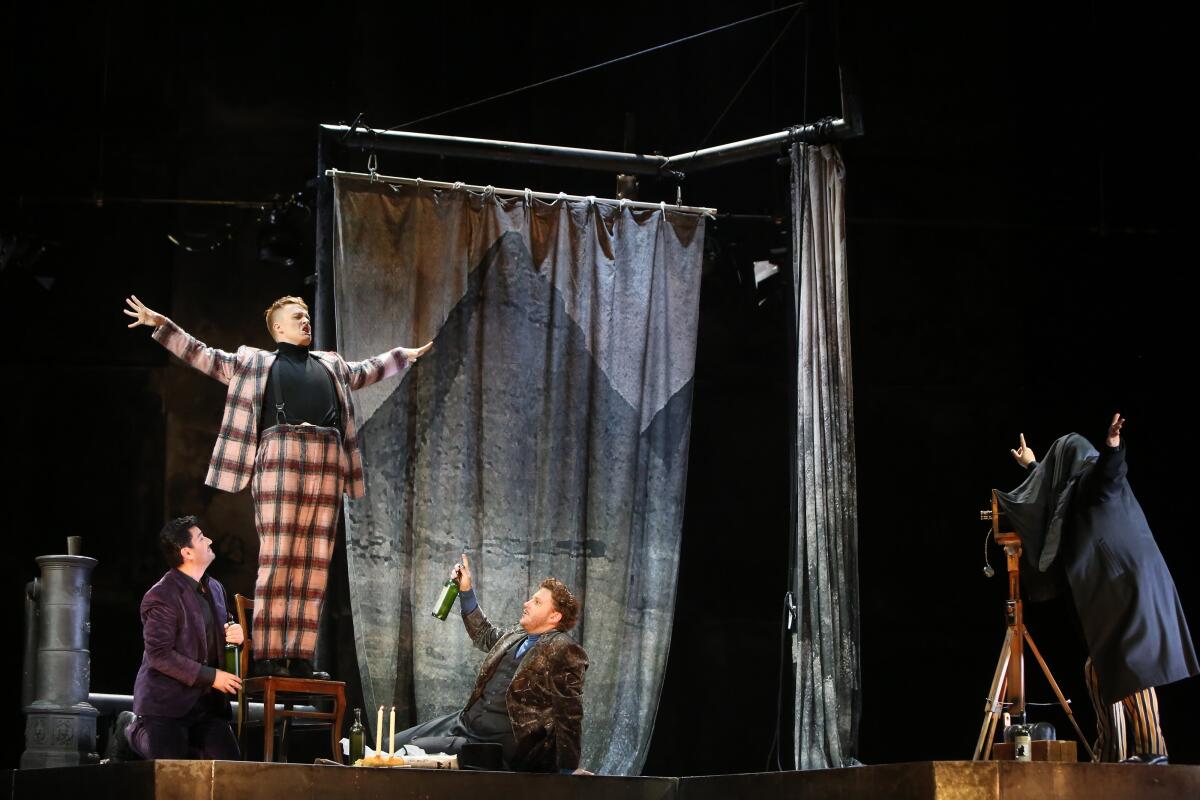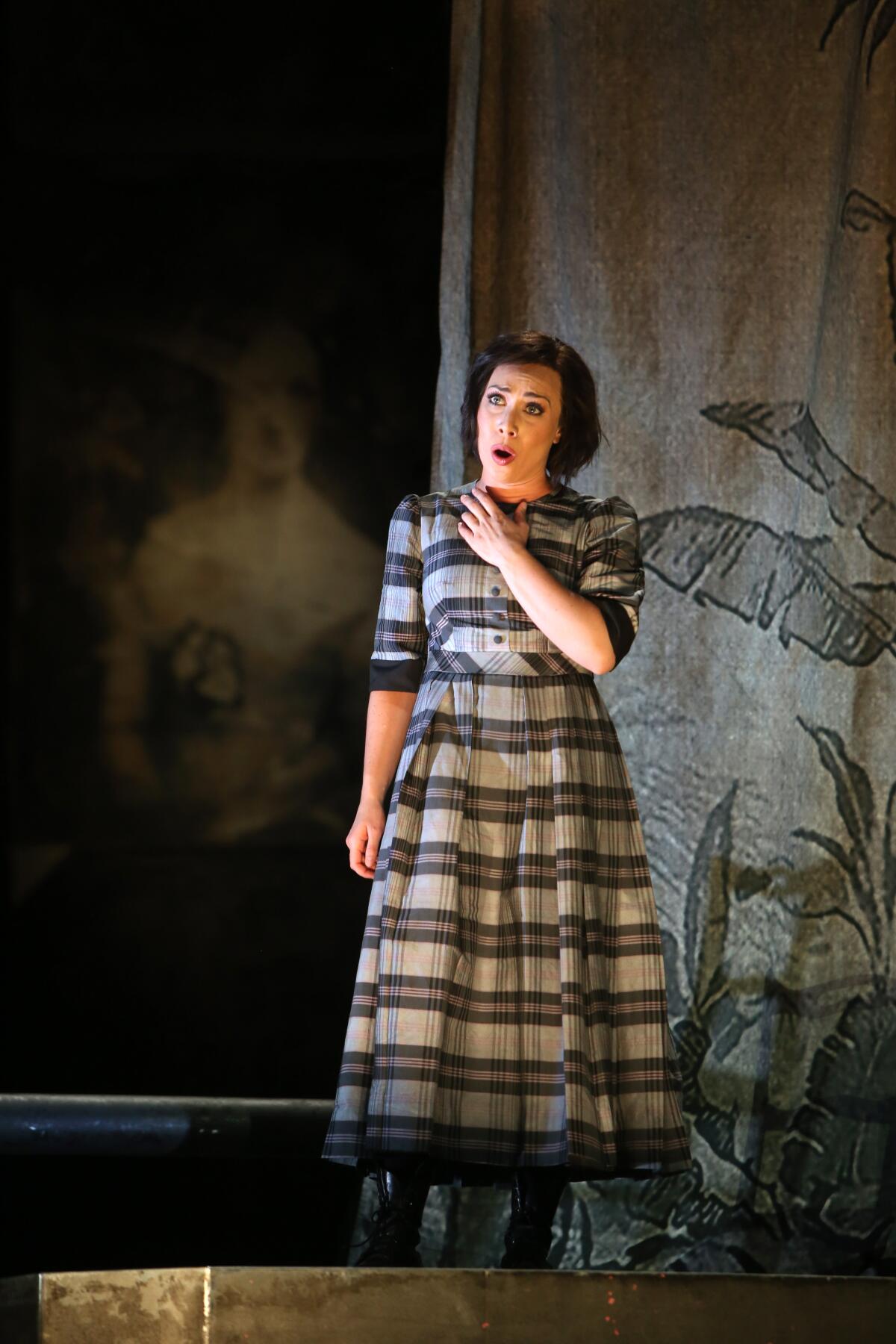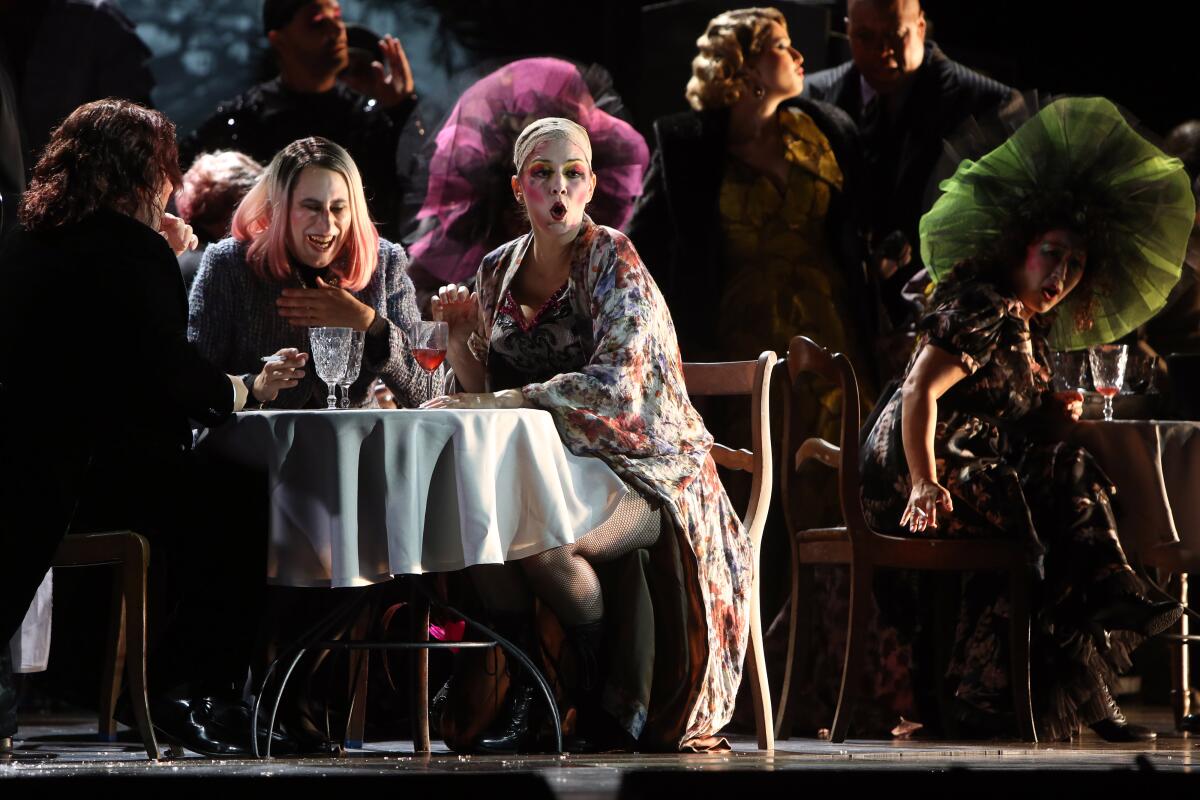Review: For an embattled L.A. Opera, a ‘La Bohème’ that points the way forward

- Share via
The opening Saturday night of Los Angeles Opera’s 34th season in the Dorothy Chandler Pavilion, at a time when the company is investigating its general director over accusations of sexual impropriety, was not about Plácido Domingo. He did not sing. He did not conduct. He did not even show up. There was no traditional welcoming letter from the general director in the program.
Domingo, furthermore, presumably had nothing to do with the new Barrie Kosky production of “La Bohème,” other than to sign off on it. Bringing Kosky to L.A. has been a mission of the company’s forward-looking president and chief executive, Christopher Koelsch. It represents a brilliant new way of looking at not only an operatic chestnut but also at theater itself.
This is Puccini for a new generation, for a world moving on. Women in this brilliant “Bohème” are newly and importantly empowered. Paris on Christmas Eve is a gathering of all types in their astonishing extravagances.
Tragedy here is not comfy Italian opera pathos but, as with the ancient Greeks, knowledge. L.A. Opera’s cute promo, promising that it’s OK to cry because the theater will be dark, is false advertising. It’s not OK to cry. It’s OK to take action.

Then again, this “Bohème” turns out to have more than a little to say about what Domingo has meant and will continue to mean artistically, in ways positive and problematic, if and when he steps down. Six of the eight main singers in the impressive cast have either been winners of Domingo’s Operalia competition or members of the Domingo-Colburn-Stein Young Artist Program.
In 1977, a 27-year-old James Conlon, now L.A. Opera’s music director, conducted “La Bohème” at the Metropolitan Opera starring guess who? Domingo not only has helped to launch the careers of maybe more singers than any other opera star but also was one of Conlon’s early supporters, hiring him in L.A. 13 years ago.
What that means for the moment is that L.A. Opera in particular — and American opera in general — is tussling between tradition and progress. We need both. The way forward is doable, as Kosky’s “Bohème” — imperfectly but still usefully transferred from the Komische Oper in Berlin — demonstrates. But it will not be easy.
Kosky, who has headed the Komische for the last decade, has made it the model of an opera house that can serve, night after night, compelling modern theater. Although a modest by German standards (it is Berlin’s third largest), Komische nonetheless is a company of 400 (a quarter larger than L.A. Opera) with government-support resources to develop a troupe of exceptional singing actors — some so fine you are initially surprised that they can even sing at all, let alone radiantly.
His “La Bohème” will open L.A. Opera’s season. Here’s why America, and especially L.A., would be lucky to see more of the outrageously clever Barrie Kosky.
The new “Bohème,” which Komische premiered last season and which was streamed this summer on the Opera Vision website, is as good an example as any of what Komische can accomplish. Even for a critic who has seen more “Bohèmes” than any reasonable person needs to in a lifetime, the production proved gripping, a revelation.
Set in Paris around the turn of the 20th century, about the time Puccini wrote it, the production felt modern anyway. The four Bohemian artists wear wacky outfits and horse around like the Beatles in “A Hard Day’s Night.” The Café Momus is a naughty phantasmagoria, at its best, Monty Python-eque.
The pretty, young, guileless, consumptive seamstress Mimì, for whom our sympathy and tears are meant, does have a bad cough, but Kosky sees to it that she is far from guileless or, for that matter, consumptive. She is a punkish life force in Dr. Martens-style boots under her dress, eager for all experience. She is a force of nature who in the end becomes to the silly, clowning-around boys the example of life fully lived. In a Kosky coup de théâtre — and I hesitate to give away exactly how — Mimì becomes all but a goddess. This is “Bohème” from her stirring point of view of what it means to be alive.

The L.A. Opera’s Domingo-centric cast has advantages and disadvantages over the Berliners. The singing Saturday was on a high level. Marina Costa-Jackson, a 2016 Operalia winner, is making her L.A. Opera debut as Mimì. The young soprano from Sandy, Utah, has a glorious, rich, wine-hued voice that has already gotten her impressive international engagements. You’ll be hearing her name again.
The cast was all youthful, and there were no weak or unappealing voices. Saimir Pirgu stood out as passionate clarion Rodolfo. Conlon conducted with a symphonic grandeur that speaks of a lifetime experience with the score.
All well and good for an old-fashioned, run-of-the-mill “Bohème.” High notes rang out where high notes have always rung out. Erica Petrocelli offered fine flair as a no-nonsense Musetta, the opera’s other formidable woman. But rather than the raw theater of Kosky’s Berliner ensemble, these remained opera singers going through the motions.
Actually, they go through only some of the motions. Kosky was unable to leave the Komische as he opens a new season there, so it was up to his assistant, Katharina Fritsch, to accomplish the culture shock of bringing this “Bohème” to America. Kosky’s powerful ideas were realized. It’s worth going for the screwball exuberance of the Café Momus scene alone. All the children dressed like little clowns as they clamored around over-the-top big clown Parpignol (Robert Stahley). But he was not as over-the-top as the choristers and dancers, each a more outlandish eyeful than the next and more than you could take in. Besides act, Kosky’s singers must be able to dance and flaunt their stuff.

But all of this stretched the ability of an American opera company working on a tight schedule. The Berlin polish was not there. The Chandler remained a challenge, too big but not disastrously so, for Rufus Didwiszus’ flexibly minimal, gritty industrial set. Victoria Behr’s original flamboyant costumes didn’t quite pop on this stage.
Chandler acoustics did not allow for intimacy, encouraging instead broad singing out. The action never stops for a second in Kosky’s productions, but here the singers kept falling into old habits of making it all about singing out to the audience, not to one another. Costa-Jackson’s beautiful diction and rolled Rs would have been great in an oratorio, but this was not the way a punk Mimì, alert to everything around her, would sound.
This fall’s classical music highlights include Esa-Pekka Salonen, “Porgy and Bess” and the L.A. Phil’s birthday gala.
Kosky did a tiny bit of tightening and made some imaginative changes that worked better in Berlin. Instead of the buffo landlord Benoit coming for the rent, the four Bohemians impersonate him themselves in a skit that was a little beyond the L.A. cast’s comic skills. Marcello (Kihun Yoon) is no longer a painter but a photographer, and his early camera becomes an object of fascination for Mimì and annoyance for his lover Musetta. A forceful singer, Yoon lacks some of the needed charisma. Much the same could be said for Nicholas Brownlee’s Colline (the philosopher) and Michael J. Hawk’s Schaunard (the musician).
This, though, was opening night, and it felt a work in progress. Cast members might well become more alert to nuance and find their own personal approaches to characters as the run continues. And as the first new “La Bohème” since 1993, Kosky’s is the move with the most moxie for a company figuring out what the next step must be.
L.A. Opera's 'La Bohème'
Where: Dorothy Chandler Pavilion, 135 N. Grand Ave., Los Angeles
When: Five more performances through Oct. 6
Tickets: $24-$349 (subject to change); the Sept. 28 performance will be simulcast free on big screens at Santa Monica Pier and Columbia Park in Torrance)
Info: (213) 972-8001 or LAOpera.org
More to Read
The biggest entertainment stories
Get our big stories about Hollywood, film, television, music, arts, culture and more right in your inbox as soon as they publish.
You may occasionally receive promotional content from the Los Angeles Times.











